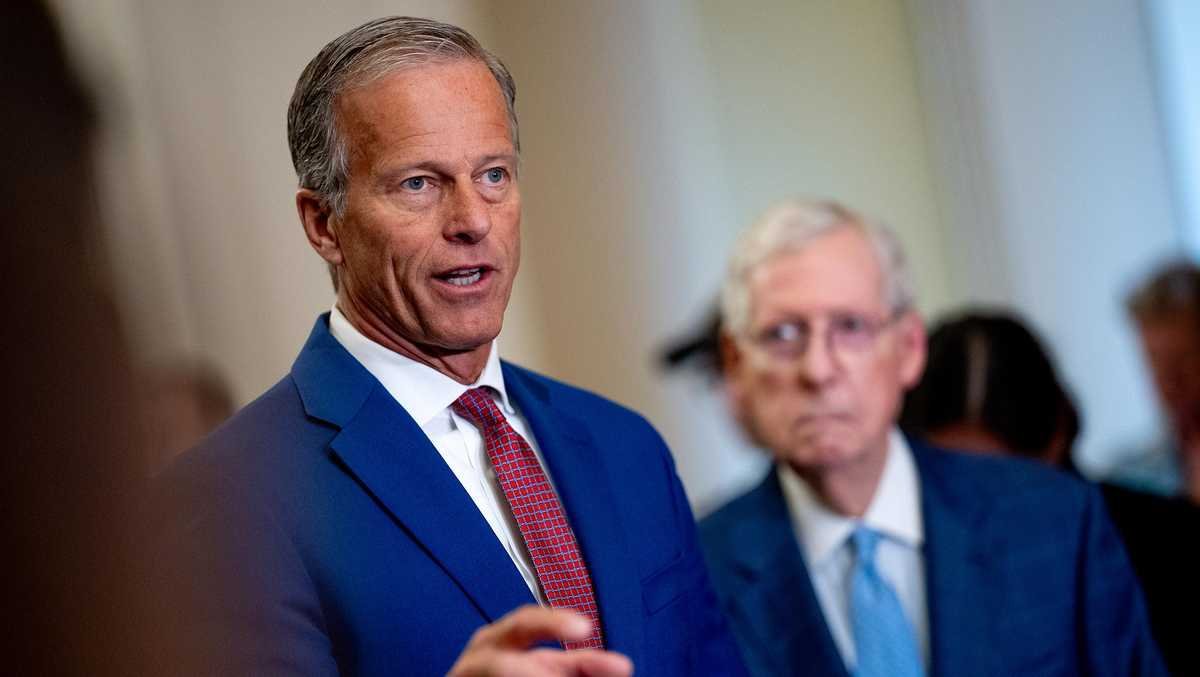The election of Republican Sen. John Thune of South Dakota as the next leader of his party in the chamber – putting him on track to become Senate majority leader next year – tasks a key ally of Mitch McConnell with shepherding the agenda of President-elect Donald Trump through Congress.
In choosing Thune — who is presently serving as minority whip, the No. 2 role in GOP Senate leadership — Republicans are elevating a leader associated with the establishment wing of the party over Florida Sen. Rick Scott, who was championed in recent days by several prominent Trump allies, including Elon Musk, Vivek Ramaswamy and Tucker Carlson. The election was conducted by secret ballot, which might have allowed Republicans wary of offending Trump’s most ardent supporters some political protection. Sen. John Cornyn of Texas, another McConnell ally, also vied for the leadership post.
Thune, who won Wednesday’s vote 29-24 in the second round of voting against Cornyn, will officially become majority leader when the new Senate is sworn in on Jan. 3. McConnell, who has led Senate Republicans since 2007, announced in February that he would step down as GOP leader this year.
In a Monday op-ed on Fox News’ website, Thune, making his case for the leadership role, urged fellow Republicans to prioritize backing Trump’s agenda, including the president-elect’s plans to crack down on immigration, bring down prices, increase domestic energy production and pass tax legislation.
“We cannot afford to take this coalition for granted. If we fail to deliver on President Trump’s priorities, we will lose their support,” Thune wrote. “They have trusted us with their votes. Now we have to roll up our sleeves and get to work.”
Immediately, Thune will be swept into a controversy brewing over Trump’s demand that the upper chamber use recess appointments to install his nominees, bypassing the formal advice and consent confirmation process, which historically has allowed the minority party to block a president’s picks. The three Republican senators who vied for majority leader all publicly supported Trump’s demand following his election victory, with Thune posting on X that “all options are on the table” to quickly confirm Trump’s nominees. Both the demand and the quick acquiescence by Thune, Scott and Cornyn signal a Republican-led Senate that will be eager to fast-track Trump’s agenda.
Thune, 63, has had a complicated relationship with the president-elect. He called for Trump to drop out of the 2016 race in the wake of the infamous “Access Hollywood” scandal – though Thune later said he still planned to vote for Trump. And he condemned Trump’s actions surrounding the Jan. 6, 2021, Capitol riot as indefensible. Still, when Trump faced a vote in the Senate following his impeachment over the incident, Thune sided with McConnell and most of the Republican caucus in voting “not guilty.”
Trump didn’t forget the slight, calling for South Dakota Gov. Kristi Noem to mount a primary challenge against Thune in 2022, though she demurred. Thune overwhelmingly won the primary that year and cruised to victory in the general election.
In May 2023, Thune endorsed Sen. Tim Scott of South Carolina in the Republican presidential primary. But, as it became clear that Trump would capture the GOP nomination for a third straight time, Thune sought to mend relations with the former president.
Thune met with Trump at the former president’s Mar-a-Lago estate in Florida in March, and they’ve spoken several times since, CNN previously reported. Thune also met with the chairs of Trump’s transition team, Howard Lutnick and Linda McMahon, in Washington earlier this month, a person familiar with the matter said.
Thune was first elected to the Senate in 2004, winning in a major upset against Sen. Tom Daschle, who was then the sitting Democratic leader.






